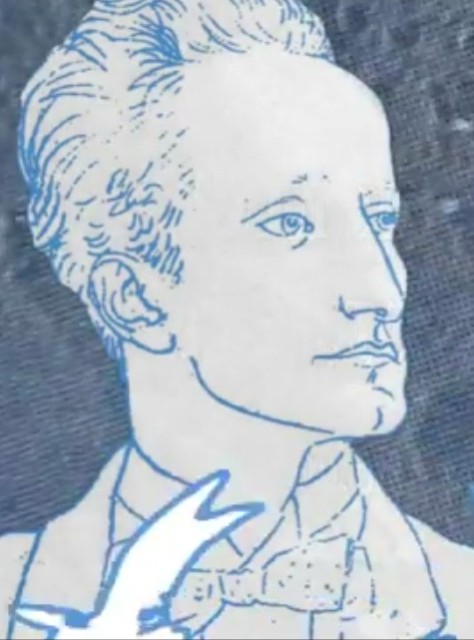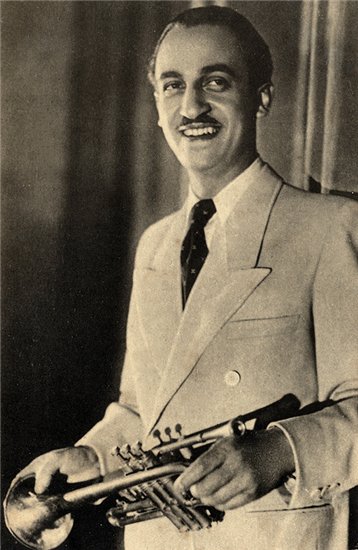Jazz music in the Soviet Union
English > Context > Music > Jazz music
Valentin Parnakh
The jazz music was introduced in the Soviet Union by the poet, musician and choreographer Valentin Yakovlevich Parnakh (1891-1951). In 1922 he came to the Soviet Union after having spent six years in Paris, and brought jazz scores, saxophones, tam-tams and trumpets with silencers with him. He founded the Первый в РСФСР эксцентрический оркестр джаз-банд Валентина Парнаха [Pervy v RSFSR eksentrichesky orkestr dzhaz-band Valentina Parnakha] or The First Eccentric Orchestra of the USSR, the Valentin Parnakh Jazzband. The first performance of the orchestra took place on October 1, 1922 in the Russian Academy of Theatre Arts in Moscow. The band became popular with New Orleans jazz or Dixieland.
Utyosov and Skomorovsky
In the 30s, the ensemble of singer and actor Leonid Osipovich Utyosov (1895-1982) and trumpeter Yakov Borisovich Skomorovsky (1889-1955) from Leningrad was one of the most renowned icons of jazz in the Soviet Union. Utyosov gave a boost to the popularity of jazz when he starred in the film Весёлые ребята [Vesholye rebyata] or Happy Friends by director Grigory Aleksandrov (1903-1983) from 1934. He sang the songs of the jazz soundtrack written by composer Isak Osipovich Dunaevsky (1900-1955) for this movie.
Two years later the duo Aleksandrov-Dunaevsky would make the movie Цирк [Tsirk] or The Circus, a good example of how in the thirties, the medium of film was used for propaganda purposes in the Soviet Union. You can read much more on The Circus in the Propaganda section of this site.
Click here to read more about The Circus
The State Jazz Orchestra
The Soviet regime distrusted the jazz music. Not only because it came from the United States, but also because improvisation was one of the essential elements of jazz. It was thus a symbol of artistic freedom and individual expression, and it was difficult to control. Therefore, the regime decided to encapsulate jazz music.
In 1936, the Комитет по делам искусств [Komitet po delam iskusstv] or Committee for Artistic Affairs, an institution directly reporting to the Sovnarkom, made the decision to establish the Государственный джаз-оркестр СССР [Gosudarstvenny dzhaz-orkestr SSSR] or the State Jazz Orchestra of the USSR. The orchestra got a typical Soviet abbreviation: it was called Госджаз [Gosdzhaz]. The artistic direction was entrusted to the composer Matvey Isaakovich Blanter (1903-1990), while conductor Viktor Nikolaevich Knushevitsky (1906-1972) was assigned to the function of musical director. The goal was to canalize the so-called массовая песня [massovaya pesnya] or mass song in the direction desired by the regime. To the vulgar jazz and pop music which was in vogue in the West, should be added a symphonic dimension. In the social mission of the orchestra was therefore specifically stated that the orchestra had to make symphonic jazz. Its music should be Симфоджаз [simfodzhaz].
From its first performance in 1938, the band made its social mission true. For the occasion, Matvey Blanter had written the song Катюша [Katyusha] on a text by poet Mikhail Vasilevich Isakovsky (1900-1973). It was sung by Valentina Batishcheva that evening, and it was an instant success.
Click here to read more about Katyusha
Big band and bourgeois music
Despite their names, the Jazzband Valentin Parnakh nor the Gosdzhaz, nor any other known bands such as the ones lead by Adolph Ignatievich Rosner (1910-1976), better known as Eddie Rosner or Alexander Naumovich Tsfasman (1906-1971) could hardly be called jazz orchestras. The repertoire consisted more of big band music with foxtrot, tango, Dixieland, swing and other popular rhythms. Jazz combos trying to play pure jazz improvisations, and thus being symbols of artistic freedom and individual expressiveness, went through difficult times.
An exception to this rule was the Ganelin Trio, which played free jazz and performed in Europe and the United States. It existed from 1970 to 1987, when band leader Vyacheslav Shevelevich Ganelin (°1944) emigrated to Israel.
In 1947, under influence of the Zhdanov doctrine, the Soviet propaganda started a large anti-cosmopolitanism campaign which lasted until 1952. The core message was that the Western culture degenerated. Soviet citizens had nothing to learn from the West, on the contrary, the progressive Westerners had much to learn from the Soviet people. The jazz bands were the victims of this ideology. Jazz and related music was described as bourgeois music and many bands were disbanded. Those who remained tried to avoid to be labeled as a jazz band, or joined the bards in the magnitizdat.
In the '70s, the jazz music became again one of the most popular music genres in the Soviet Union. From the '80s it was strongly reduced however by the rise of the rock and roll.
Share this page |


